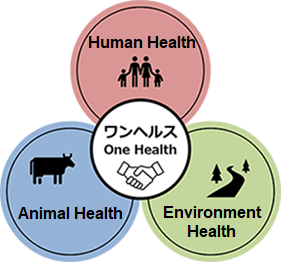Zoonotic pathogens such as bacteria and viruses are a significant threat for animal and public health. It has been suggested that novel coronavirus infection in human, which has been a global pandemic since the end of 2019, considered to be derived from wild animals, and that the influenza epidemic caused by the H1N1 subtype in 2009 was also derived from swine. Furthermore, the elimination of foodborne infectious diseases from food chains and the health damage to humans and livestock caused by antimicrobial-resistant bacteria are also regarded as problems. Therefore, efforts are required to reduce these risks from the aspect of One Health approach.
Therefore, in the division of zoonosis research, which consists of the emerging virus group and the enteric pathogen group, we are developing methods to inhibit the infection cycle based on the elucidation of the transmission and persistence mechanisms of pathogens such as influenza virus, pathogenic Escherichia coli, Salmonella, and Campylobacter, and are also analyzing molecules that lead to the development of effective vaccines and drugs. Our goal is to develop effective disease control technology applicable at field of livestock production, to enable early detection and early response of zoonosis derived from animals, and to contribute to the realization of a society resistant to infectious diseases.








